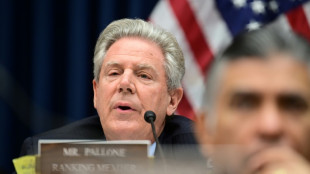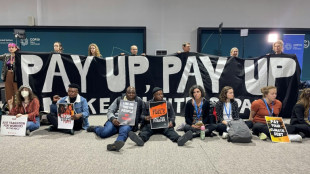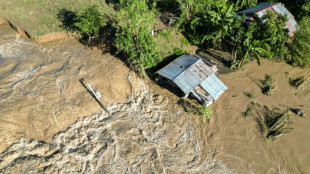
-
 Son of Norwegian princess arrested on suspicion of rape
Son of Norwegian princess arrested on suspicion of rape
-
Romanian court says 'irregularities' in influencer Andrew Tate's indictment

-
 Iran faces fresh censure over lack of cooperation at UN nuclear meeting
Iran faces fresh censure over lack of cooperation at UN nuclear meeting
-
Despondency and defiance as 45 Hong Kong campaigners jailed

-
 Scholar, lawmakers and journalist among Hong Kongers jailed
Scholar, lawmakers and journalist among Hong Kongers jailed
-
European stocks slide on fears of Russia-Ukraine escalation

-
 Police break up Georgia vote protest as president mounts court challenge
Police break up Georgia vote protest as president mounts court challenge
-
Spain royals visit flood epicentre after chaotic trip

-
 France's Gisele Pelicot says 'macho' society must change attitude on rape
France's Gisele Pelicot says 'macho' society must change attitude on rape
-
G20 leaders talk climate, wars -- and brace for Trump's return

-
 US lawmaker accuses Azerbaijan in near 'assault' at COP29
US lawmaker accuses Azerbaijan in near 'assault' at COP29
-
Tuchel's England have 'tools' to win World Cup, says Carsley

-
 Federer hails 'historic' Nadal ahead of imminent retirement
Federer hails 'historic' Nadal ahead of imminent retirement
-
Ukraine vows no surrender, Kremlin issues nuke threat on 1,000th day of war

-
 Novo Nordisk's obesity drug Wegovy goes on sale in China
Novo Nordisk's obesity drug Wegovy goes on sale in China
-
Spain royals to visit flood epicentre after chaotic trip: media

-
 French farmers step up protests against EU-Mercosur deal
French farmers step up protests against EU-Mercosur deal
-
Rose says Europe Ryder Cup stars play 'for the badge' not money

-
 Negotiators seek to break COP29 impasse after G20 'marching orders'
Negotiators seek to break COP29 impasse after G20 'marching orders'
-
Burst dike leaves Filipino farmers under water

-
 Markets rally after US bounce as Nvidia comes into focus
Markets rally after US bounce as Nvidia comes into focus
-
Crisis-hit Thyssenkrupp books another hefty annual loss

-
 US envoy in Lebanon for talks on halting Israel-Hezbollah war
US envoy in Lebanon for talks on halting Israel-Hezbollah war
-
India to send 5,000 extra troops to quell Manipur unrest

-
 Sex, drugs and gritty reality on Prague's underworld tours
Sex, drugs and gritty reality on Prague's underworld tours
-
Farmers descend on London to overturn inheritance tax change

-
 Clippers upset Warriors, Lillard saves Bucks
Clippers upset Warriors, Lillard saves Bucks
-
Acquitted 'Hong Kong 47' defendant sees freedom as responsibility

-
 Floods strike thousands of houses in northern Philippines
Floods strike thousands of houses in northern Philippines
-
Illegal farm fires fuel Indian capital's smog misery

-
 SpaceX set for Starship's next flight, Trump expected to attend
SpaceX set for Starship's next flight, Trump expected to attend
-
Texans cruise as Cowboys crisis deepens

-
 Do the Donald! Trump dance takes US sport by storm
Do the Donald! Trump dance takes US sport by storm
-
Home hero Cameron Smith desperate for first win of 2024 at Australian PGA

-
 Team Trump assails Biden decision on missiles for Ukraine
Team Trump assails Biden decision on missiles for Ukraine
-
Hong Kong court jails 45 democracy campaigners on subversion charges

-
 Several children injured in car crash at central China school
Several children injured in car crash at central China school
-
Urban mosquito sparks malaria surge in East Africa

-
 Djibouti experiments with GM mosquito against malaria
Djibouti experiments with GM mosquito against malaria
-
Pulisic at the double as USA cruise past Jamaica

-
 Many children injured after car crashes at central China school: state media
Many children injured after car crashes at central China school: state media
-
Asian markets rally after US bounce as Nvidia comes into focus

-
 Tens of thousands march in New Zealand Maori rights protest
Tens of thousands march in New Zealand Maori rights protest
-
Five takeaways from the G20 summit in Rio

-
 China, Russia ministers discuss Korea tensions at G20: state media
China, Russia ministers discuss Korea tensions at G20: state media
-
Kohli form, opening woes dog India ahead of Australia Test series

-
 Parts of Great Barrier Reef suffer highest coral mortality on record
Parts of Great Barrier Reef suffer highest coral mortality on record
-
Defiant Lebanese harvest olives in the shadow of war

-
 Russian delegations visit Pyongyang as Ukraine war deepens ties
Russian delegations visit Pyongyang as Ukraine war deepens ties
-
S.Africa offers a lesson on how not to shut down a coal plant


'All night' shelling throws doubt on Russia's de-escalation in Ukraine
Ukraine on Wednesday accused Russia of shelling a city where it had promised de-escalation, dampening hopes of any resolution to a conflict that has killed thousands and displaced millions.
Ukraine and Western powers had already cast doubt on Russia's pledge to reduce military activity around Chernigiv and the capital Kyiv, made during face-to-face talks in Istanbul on Tuesday.
"Chernigiv was shelled all night," regional governor Vyacheslav Chaus wrote on social media.
AFP reporters on Wednesday could also hear frequent explosions coming from the direction of the suburban town of Irpin to the northwest of Kyiv.
Ukrainian forces have said they are in control of the town but emergency services said it was still too dangerous for civilians to access.
"The area might be within mortar range so it is still dangerous," said Petro Kyseliov, acting head of the State Emergency Service of Ukraine in Kyiv.
Russian officials had pledged to "radically" reduce attacks because of progress in negotiations on "the neutrality and non-nuclear status" of Ukraine -- two central concerns for Moscow.
Both sides called the Istanbul meeting "meaningful" and "positive" but the Kremlin on Wednesday played down hopes of a breakthrough.
"We cannot state that there was anything too promising or any breakthroughs," Kremlin spokesman Dmitry Peskov told reporters.
"There is a lot of work to be done," Peskov said.
Stock markets, which had been buoyed up by Tuesday's more hopeful comments, slid again and oil prices rose back up on supply concerns.
The Pentagon said Russia had merely repositioned a "small number" of forces near Kyiv, and could be preparing a "major offensive" elsewhere.
The "vast majority" of Russian forces around Kyiv remained in place, said Pentagon spokesman John Kirby.
Ukraine's military also warned the withdrawal of Russian troops around Kyiv and Chernigiv "is probably a rotation of individual units and aims to mislead".
Still, the talks in Istanbul marked the first sign of progress in discussions to end the conflict, with Kyiv's negotiator David Arakhamia saying there were "sufficient" conditions for Zelensky to meet Russian President Vladimir Putin.
- 'We'll see' -
But Ukraine's Western allies said they had no plans to ease measures taken to punish Russia for the invasion.
"We'll see if they follow through on what they're suggesting," US President Joe Biden said Tuesday after speaking with the leaders of Britain, France, Germany and Italy, who vowed no let-up in sanctions.
On Wednesday, Poland urged the European Union to impose a tax on Russian hydrocarbon imports while Germany raised the alarm level under its emergency gas plan over fears Russia could cut supplies to countries that refuse its demand to be paid in rubles.
Russia meanwhile worked on shoring up support from allies.
On a visit to China on Wednesday, Russian Foreign Minister Sergei Lavrov said: "We, together with you, and with our sympathisers will move towawards a multipolar, just, democratic world order."
Lavrov will go this week to India, which has abstained from UN resolutions censuring Russia and continues to buy Russian oil and other goods, despite pressure from Washington.
Ukraine says Russia, which launched its invasion on February 24, is on the back foot.
In recent days, Ukraine's fighters have recaptured territory including Irpin.
"The Russians were slowly backed off from Irpin... So now the priority task is to go there and bring back the bodies of those killed," Kyseliov said.
"The bodies are still lying around the streets, they are starting to decay and smell and dogs and other animals are starting to eat them," he said.
- 'Death everywhere' -
Some 20,000 people are believed to have been killed in the conflict so far, according to Zelensky, though the number of casualties could not be independently verified.
On Tuesday a Russian missile strike on the southern town of Mykolaiv left at least 14 dead, Ukrainian officials said.
There was also no progress for the estimated 160,000 people still trapped with little food, water or medicine in the devastated southern port city of Mariupol.
Russian forces have encircled the city and their steady and indiscriminate bombardment has killed at least 5,000 people, but possibly as many as 10,000, according to one senior Ukrainian official.
France, Greece and Turkey have been trying to organise a mass evacuation of civilians from the city, but talks between French President Emmanuel Macron and Putin ended Tuesday without a deal.
On Wednesday, Ukrainian ombudswoman Lyudmyla Denisova said a Red Cross facility was targeted by Russian aircraft and artillery.
Aid groups have called regularly for access to Mariupol, decrying hellish conditions, and Ukrainian officials have accused Russian troops of forcibly deporting residents to Russia.
Civilians who have managed to escape Mariupol describe a place with "death everywhere".
"We buried our neighbours, we saw death everywhere and even my children saw it," said Mariia Tsymmerman, who fled to Zaporizhzhia two weeks ago but is now making the perilous journey back to deliver supplies and help others leave.
burs-dt/bp
R.Garcia--AT
